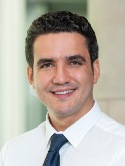Craniospinal irradiation and/or intraventricular radioimmunotherapy after high-dose chemotherapy and autologous stem cell rescue in patients with CNS retinoblastoma—Safety and outcomes Journal Article
| Authors: | Sait, S. F.; Kernan, N. A.; Klein, E.; Spitzer, B.; Levy, C. F.; Fish, J.; Yildirim, O.; Haque, S.; Donzelli, M.; Bernot, M. R.; Abramson, D. H.; Francis, J. H.; Khakoo, Y.; Karajannis, M.; Sands, S.; Pandit-Taskar, N.; Wolden, S.; Kramer, K.; Dunkel, I. J. |
| Article Title: | Craniospinal irradiation and/or intraventricular radioimmunotherapy after high-dose chemotherapy and autologous stem cell rescue in patients with CNS retinoblastoma—Safety and outcomes |
| Abstract: | Background: The prognosis for patients with central nervous system (CNS) retinoblastoma (RB) (trilateral or stage 4b metastatic RB) treated with high-dose chemotherapy and autologous stem cell transplant (HDC-ASCT) remains poor. The impact of irradiation when administered as part of upfront therapy post HDC-ASCT on treatment outcomes and survival is unknown. Methods: We performed a retrospective review of all patients with CNS RB (seven stage 4b, eight trilateral, one pineal lesion belonging to methylation group RB) who underwent induction chemotherapy with an intent to proceed to HDC-ASCT at two institutions. Results: Twelve of 16 patients (n = 75%) achieved an objective response to induction chemotherapy, while four patients had progressive/refractory disease; two patients responded to subsequent therapy and proceeded to ASCT, and two patients did not. Seven of 14 patients who underwent HDC-ASCT, received radiotherapy as part of upfront therapy post HDC-ASCT in the form of craniospinal irradiation (CSI) (n = 3), intraventricular radioimmunotherapy (n = 3), or both CSI and intraventricular radioimmunotherapy (n = 1). The Kaplan–Meier estimate of overall survival for these patients was 62.5% at 5 years; no patients developed second malignant neoplasms within the radiation fields. For the seven patients who did not receive radiotherapy, the overall survival was 28.6% at 5 years. Conclusions: CSI (23.4 Gy) alone or in conjunction with intraventricular RIT may have clinical utility in eliminating persistent MRD post HDC-ASCT, contributing to improved disease-free survival in patients with CNS RB. This treatment strategy merits evaluation in a prospective, multicenter clinical trial for patients with CNS metastatic RB. © 2024 Wiley Periodicals LLC. |
| Keywords: | adolescent; child; clinical article; controlled study; preschool child; child, preschool; survival rate; retrospective studies; unclassified drug; overall survival; clinical trial; mortality; cisplatin; drug safety; multimodality cancer therapy; cancer patient; combined modality therapy; topotecan; cancer staging; drug megadose; follow up; follow-up studies; antineoplastic agent; carboplatin; etoposide; antineoplastic combined chemotherapy protocols; radiotherapy; cohort analysis; cyclophosphamide; vincristine; autologous stem cell transplantation; stem cell transplantation; hematopoietic stem cell transplantation; retinoblastoma; pathology; retina tumor; retinal neoplasms; medical record review; retrospective study; thiotepa; central nervous system tumor; central nervous system neoplasms; infant; multicenter study; kaplan meier method; radioimmunotherapy; radiation field; transplantation, autologous; disease exacerbation; therapy; protein methylation; induction chemotherapy; craniospinal irradiation; autotransplantation; clinical outcome; compartmental radioimmunotherapy; retinoblastoma binding protein; procedures; post treatment survival; refractory disease; humans; prognosis; human; male; female; article; evaluation study; central nervous system cancer; naxitamab; intraventricular compartmental radioimmunotherapy; omburtamab iodine i 131; cns metastatic retinoblastoma; naxitamab i 131 |
| Journal Title: | Pediatric Blood and Cancer |
| Volume: | 71 |
| Issue: | 11 |
| ISSN: | 1545-5009 |
| Publisher: | Wiley Periodicals, Inc |
| Date Published: | 2024-11-01 |
| Start Page: | e31297 |
| Language: | English |
| DOI: | 10.1002/pbc.31297 |
| PUBMED: | 39217426 |
| PROVIDER: | scopus |
| DOI/URL: | |
| Notes: | Article -- MSK Cancer Center Support Grant (P30 CA008748) acknowledged in PubMed and PDF -- MSK corresponding author is Sameer Farouk Sait -- Source: Scopus |
Altmetric
Citation Impact
BMJ Impact Analytics
MSK Authors
-
 148
148Karajannis -
 512
512Kernan -
 379
379Dunkel -
 239
239Kramer -
 150
150Khakoo -
 565
565Wolden -
 267
267Francis -
 151
151Haque -
 397
397Abramson -
 348
348Pandit-Taskar -
 47
47Donzelli -
 50
50Klein -
 25
25Sands -
 70
70Farouk Sait -
 32
32Yildirim
Related MSK Work



